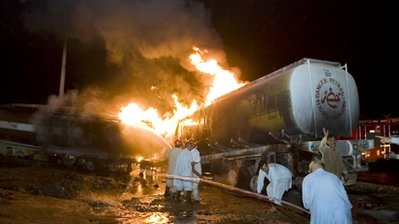Asia-Pacific
Gunmen attack NATO supply trucks in Pakistan
(Agencies)
Updated: 2010-10-06 13:46
 |
Large Medium Small |
QUETTA, Pakistan - Gunmen in Pakistan attacked and set fire to 20 trucks carrying supplies to NATO troops in Afghanistan on Wednesday, police said, the latest in a series of attacks on the logistical backbone of the war in Afghanistan.
 Pakistani fire fighters struggle to extinguish burning oil tankers after militants attacked a terminal in Rawalpindi, Pakistan, early Monday, Oct 4, 2010. [Photo/Agencies] |
Pakistani authorities, angered by repeated incursions by NATO helicopters from Afghanistan, last week blocked a supply route for the troops in Afghanistan. The latest attack on fuel tankers took place along another route.
Fourteen gunmen in two pickup trucks opened fire on the tankers, destroying five and killing a driver, following attacks on other tankers claimed by Taliban militants on Sunday. One person was killed.
The bulk of supplies for the foreign forces in Afghanistan moves through Pakistan which is itself battling a deadly homegrown Taliban insurgency.
Analysts say supply routes to Afghanistan give Pakistan leverage over the United States' war efforts in Afghanistan, although Pakistan often cites security concerns as reasons for closures.
US pressure on Pakistan to crack down harder on militants in its northwest tribal areas who cross the border to attack US-led NATO troops in Afghanistan is one source of friction.
Tensions could deepen if Washington demands more cooperation from Pakistan before a gradual US troop withdrawal from Afghanistan, which has raised concerns over the country's stability, starts in July 2011.
An alleged al-Qaida plot to attack European targets has put Pakistan's performance against militants under scrutiny again.
European and American counter-terrorism officials have said that concerns about a group of about 100 German Islamists who had travelled between Germany and the tribal border areas of Pakistan contributed to the latest security alert in Europe.
A new White House assessment concludes that Pakistan has been unwilling to aggressively pursue al-Qaida and Afghan Taliban militants in a Pakistani tribal region.
The White House assessment, first reported by The Wall Street Journal on Tuesday and confirmed by Reuters, faults the Pakistan government and military for lacking the will to take action against the militants in North Waziristan.
US officials say they have been giving Islamabad breathing space in the battle against the militants because the Pakistani military has been over-stretched in other operations and by humanitarian missions in the flooding that devastated Pakistan.
Incursions
Pakistan has repeatedly said it is doing all it can to fight the militancy, pointing to the thousands of people it has lost in a wave of attacks over the past three years. It has, however, said it will not tolerate any incursions by foreign troops into its territory.
The Pentagon said on Tuesday that NATO will soon release the results of a joint probe by with Pakistan into last week's killing of three Pakistani soldiers in cross-border strike by NATO helicopters.
Pentagon Press Secretary Geoff Morrell did not elaborate on the findings but appeared to play down the likelihood of any major revelations. He described the helicopter strike as a "regrettable mistake."
The incident occurred in Pakistan's western Kurram region, when NATO forces were investigating what appeared to be a new Taliban fighting position along the border, Morrell said.
"I guess they came under fire while they were checking out that position," he added.
The United States has also ramped up a covert campaign of drone strikes against insurgent targets within Pakistan's borders, further fueling concern of a more aggressive US war strategy.



